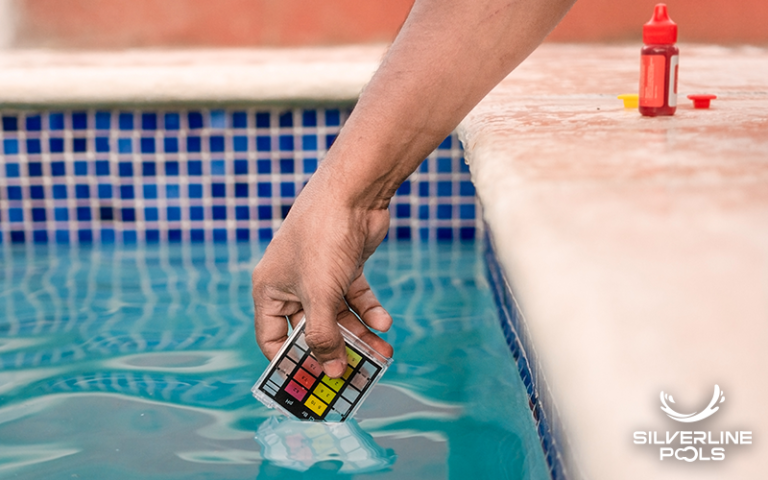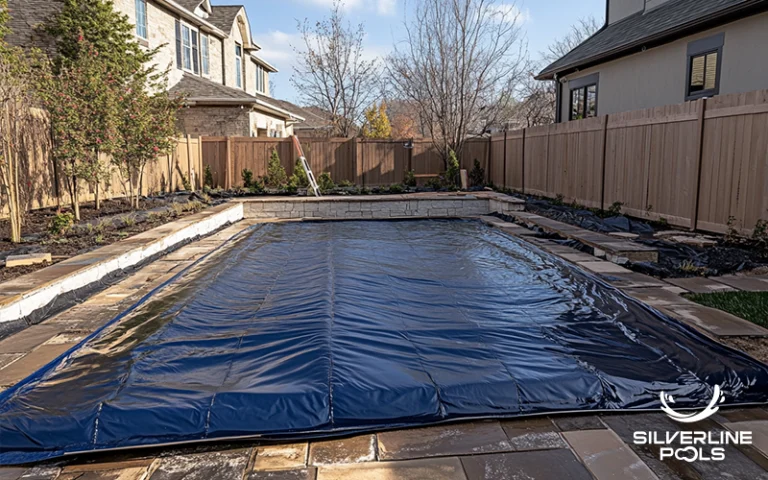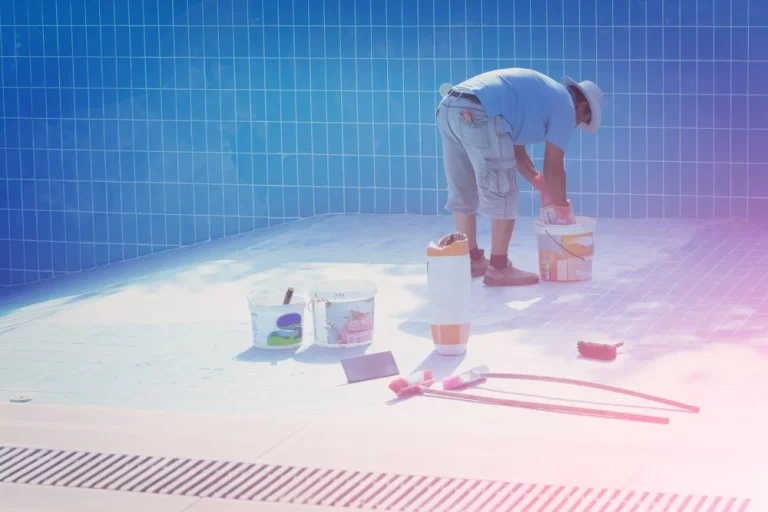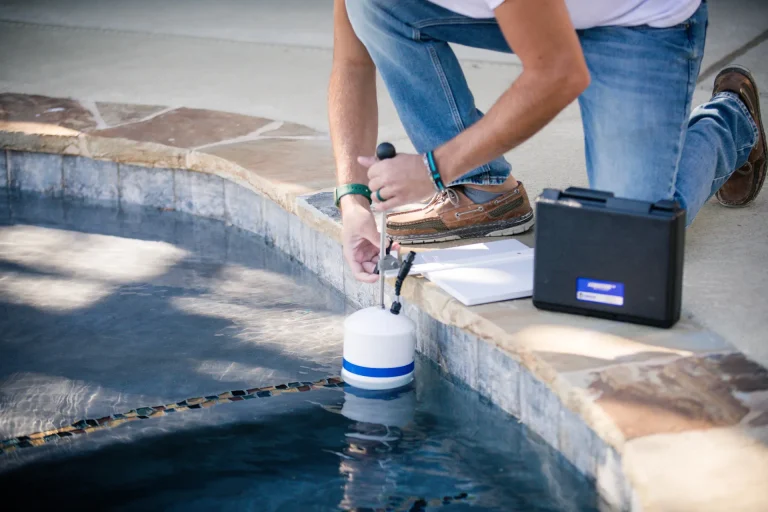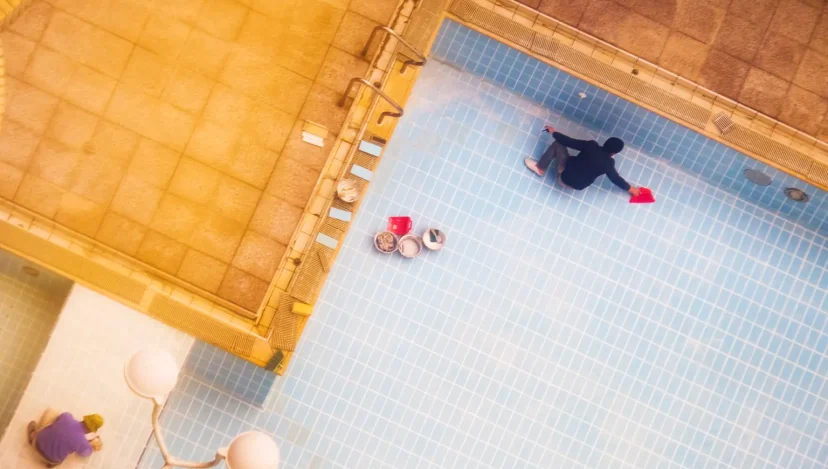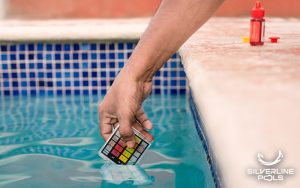Pool stains are discolorations on the pool walls, bottom, or other surfaces. The unsightly stains on the pool surface, floor, steps, or liner affect the pool’s aesthetics and indicate an imbalance in the water chemistry. However, through pool care such as brushing, pool shock, adding vitamin C etc., these pool stains can be cleaned.
In this blog, we’ll explore the causes of pool stains and their disadvantages. Our expert guide also dives deep into various methods to remove pool stains and tips to prevent them in the future.
How do I identify swimming pool stains?
Most pool owners want accurate data for pool stains. Testing your pool stains is an excellent idea for knowing whether your pool stain is organic or metal. Here is how to do it:
1. Organic Stain Test
Take a minimal quantity of chlorine granules. Scrub the chlorine granules on the stain with a brush. Now, if the stain vanishes, it is organic. If not, it may be a metallic stain.
2. Metal Stain Test
For the metal stain test, we use ascorbic acid. Scrub some ascorbic acid or Vitamin C powder onto the stain with a brush. If the stain is metallic, it will slowly disappear.
What are the causes of pool stains?
Stains can originate from various sources. Understanding their cause is necessary to determine the most effective stain removal method. Here are the common reasons behind pool stains:
- Metals
- Organic Materials
- Algae and Bacteria
- Minerals
1. Metals
One of the primary culprits for stains in the pool water is the presence of metals, such as iron and copper. These metals can enter the pool from various sources, including fill water, corroding pool equipment, or metal-based algaecides.
2. Organic Materials
Leaves, twigs, and other organic debris can accumulate in your pool, creating brown or greenish stains. These stains often develop in areas where debris settles.
3. Algae and Bacteria
The growth of algae or bacteria in the pool can result in stains, with different types of algae causing various colored stains.
4. Minerals
Stains caused by minerals are considered as inorganic stains. High mineral content such as iron, copper, manganese, etc., in the pool water can lead to scaling and staining. Calcium, in particular, can form white, chalky deposits on pool surfaces.
The table below shows common minerals that cause stains, their sources, and their resultant colors on the pool.
| Mineral | Source | Pool Stain Color |
| Calcium | Grout, Hard Water, Mortar, Cal-Hypo Shock | White or Light Gray Crystals or Precipitates |
| Cobalt | Fiberglass Pool Shells | Black, Dark Gray |
| Copper | Copper Algaecides, Ionizers, Corrosion of Copper Equipment | Teal, Black, Deep Blue, Reddish-Brown, Blue-Green, Green, Yellow-Brown, or Purple |
| Iron | Well Water, Corrosion of Iron Pipes, Pool Heaters, or other Equipment | Black, Pale Green, Dark Red/Orange, Brown, or Blue-Gray |
| Manganese | Well Water | Black, Purple, Pink, Rose, Green |
| Nickel | Corrosion of Nickel-Coated Equipment | Brown, Green, Black |
How do I remove organic pool stains?
Removing organic pool stains is simple. Here are the steps to remove organic pool stains:
Step 1: Removing Leaves and Debris
Remove and clean leaves and debris from the pool water surface through a pool net.
Step 2: Shock the Pool Water
Check the pool’s chlorine, pH, and alkalinity levels before shocking it. Pool shock treatment raises chlorine levels to kill pool algae and bacteria in a green pool. It also helps remove stains or organic debris. We recommend shocking your pool at night for efficient chlorine functioning.
Step 3: Brushing the Pool Stains
Now it’s time to brush stained area of your pool. Brush your pool walls, bottom, corners, stairs, and hard-to-reach areas. Ensure that no small space is left untreated.
Step 4: Running the Pool’s Pump
Run your pool pump at full speed for at least 8 hours to filter the organic contaminants and loose debris.
Step 5: Brush the Stains Again
Some stubborn pool stains may want another brushing session. Identify and brush these stains again.
How do I remove metal stains in my pool?
So, if your metal stain test has revealed metal to be responsible for the stains, don’t worry. We have a solution for your swimming pool metal stains as well. The steps below will prevent your metal stains from permanently setting in your luxury pool.
Step 1: Lowering the Chlorine Levels
As chlorine is a natural oxidizer, lower its level below 0 ppm. Using a chlorine neutralizer will solve this headache for you.
Also Read, Chlorine vs Bromine – Which is Right Pool Sanitizer?
Step 2: Adding Vitamin C or Ascorbic Acid to the Stained Pool
Ascorbic acid, or Vitamin C, can be an effective metal stain remover. We recommend adding a half-pound of ascorbic acid for every 10,000 gallons of pool water for more significant stains. Follow specific instructions and safety precautions when using this method.
Step 3: Run the Pool Circulation System
Run the pool motor for half an hour to circulate your stain-eliminating ingredients throughout the pool.
Step 4: Extensive Pool Brushing
Though the primary focus for removing metal stains is cleaning the chemicals that cause them, brushing will help the pool stains get less stubborn. Use a stainless steel brush for concrete and gunite pools, while a nylon brush works best for vinyl or fiberglass pools.
Step 5: Inspect Your Pool Again
Inspect your pool stains again thoroughly to check for any remaining residual stains. If there are any signs of metal pool stains, repeat the above process several times until your pool turns crystal clear.
What are the standard pool stain colors?
While treating your pool’s stains, it is necessary to understand the stains by type and color. The table below shows the most common stain colors to help pool owners treat pool stains according to their unique color.
| Stain Color | Caused By |
| Green and Brown Pool Stains | Leaves, Plants Matter, Algae |
| Red or Blue Stains | Organic matter with intense coloring |
| Green or Blue Stains | Corrosion of copper in piping and plumbing system |
| Red or Brown Stains | Indicates iron stains |
| Purple or Black Stains | Manganese in pool water or municipal water supply |
What are the disadvantages of pool stains?
Here are some cons of having stains on your pool surfaces or walls.
- Stains negatively impact the visual appeal of the pool.
- Some stains, mainly algae, indicate an imbalance in water chemistry that can irritate swimmers’ skin and eyes or cause respiratory problems.
- Metal stains can interfere with the effectiveness of chlorine or other sanitizers.
- Some stains, particularly metal stains, can be stubborn when not properly cleaned.
- If left unchecked, some stains can even damage the pool surface.
How do I prevent pool stains in the future?
Follow the below tips to save your backyard haven from stain attacks in the future:
1. Proper Water Chemistry
Maintaining balanced water chemistry is vital to preventing staining. Regularly test and adjust the pH, alkalinity, and calcium hardness levels to keep the water within the recommended parameters.
2. Use of Sequestrants
Consider using sequestrants or metal control agents to prevent metals from staining your pool. These chemicals help bind to and prevent the metals from reacting with the pool surfaces.
3. Filtration and Skimming
Keep your pool clean by regularly skimming debris from the surface and using an effective filtration system. This will help reduce the accumulation of organic materials that can cause stains.
4. Algaecide Treatment
Regularly add algaecides to your pool to prevent the growth of algae, which can lead to different types of stains.
Silverline Pools: Your Best Pool Cleaning and Maintenance Company
Are pool stains a hindrance to your pool’s swimming fun? Worry no longer—Silverline Pools has your back! We provide comprehensive pool maintenance and cleaning services to keep your pool a sparkling, clean home picnic spot.
Here is what our customized pool cleaning and maintenance services include:
- Pool Shocking
- Pool Stains Removal
- Acid Washing
- Brushing and Scrubbing Your Pool
- Pool Chemical Balance
Wrapping Up
In conclusion, pool stains are a common issue that can detract from the beauty and clarity of your pool. To prevent and remove stains, it’s essential to understand their causes. You must then take appropriate steps to maintain proper water chemistry, take preventive measures, and use the correct stain removal methods.
If you’re struggling with stubborn stains or need assistance with stain removal, don’t hesitate to contact Silverline Pools for expert pool stain removal.
Frequently Asked Questions
How do you remove stubborn pool stains?
Shocking or super-chlorinating your pool is an excellent way to remove stubborn pool stains.
Does muriatic acid remove pool stains?
The corrosive effects of muriatic acid remove pool stains and calcium deposits from pool surfaces and equipment. We firmly insist on handling muriatic acid with great caution.
Does pool stain eraser work?
Pool stain removers depend on stain type and severity. However, you can remove the pool stains using a stain remover.
Does high pH cause pool staining?
A high pool pH can oxidize the pool metals, resulting in metal stains.
How do I remove pool stains without draining the pool?
Adding a strongly acidic solution to your pool will remove your pool stains without draining the pool. This solution is also known as an acidic pool bath.


